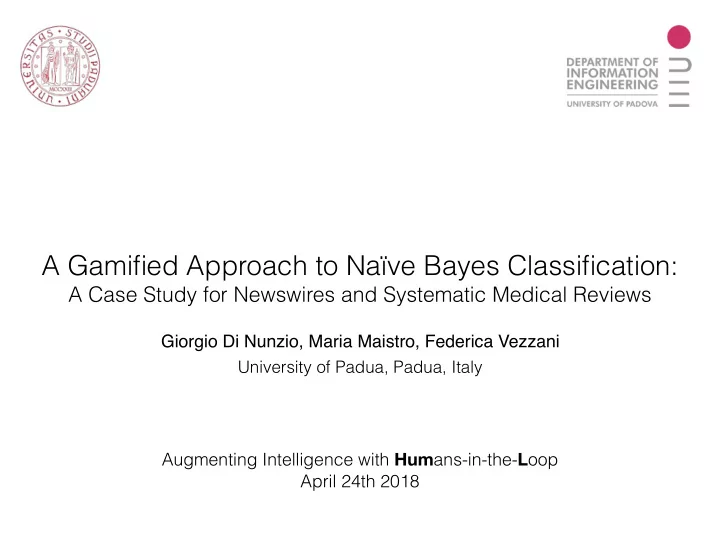

A Gamified Approach to Naïve Bayes Classification: A Case Study for Newswires and Systematic Medical Reviews Giorgio Di Nunzio, Maria Maistro, Federica Vezzani University of Padua, Padua, Italy Augmenting Intelligence with Hum ans-in-the- L oop April 24th 2018
Summary • Creation of a ground-truth, or golden standard, is usually very expensive as it requires a manual labelling of the objects by experts in the field. • Crowd-sourcing? • How do we motivate people?
QuickDraw
Outline • Gamification vs Interpretability • The Classification Game vs the RPG • Experimental Results • Ongoing Work
Gamification "The use of game design elements in non-game context"
Interpretability (in Interactive Machine Learning)
Mihael Ankerst, Christian Elsen, Martin Ester, and Hans-Peter Kriegel. Visual classification: an interactive approach to decision tree construction. In Proceedings of the ACM SIGKDD 1999
Jerry Alan Fails and Dan R. Olsen, Jr.. Interactive machine learning. In Proceedings of the ACM IUI 2003.
Saleema Amershi, Max Chickering, Steven M. Drucker, Bongshin Lee, Patrice Simard, and Jina Suh. ModelTracker: Redesigning Performance Analysis Tools for Machine Learning. In Proceedings of the ACM CHI 2015
Math Background Given two classes c 1 and c 2 , an object o is assigned to category c 1 if the following inequality holds P ( o | c 2 ) < m P ( o | c 1 ) + q | {z } | {z } y x Parameters that the user can modify through the game y and x axis represented in the interface
Classification on a two Dimensional Plot Classification Line Class c 1 Class c 2
Experiments 1. Pilot experiment: PhD and PostDoc students 2. European Researcher’s Night 2016: kids of primary and secondary schools 3. Banca d’Italia exhibition for the brand new 50 euro note: people from different ages and background 4. European Researcher’s Night 2017 5. Role Playing Game with the Students of a Master Degree in Languages
First Interface q Parameter m Parameter
Second Interface Training Validation
Third Interface
Fourth Interface Simulate a two-fold cross validation! Player one Player two
Objective of the Study • Compare • How many resources the player "thinks" s/he needs to win the game • Player vs Algorithm (trained on the same data) • Algorithm vs Algorithm (trained on the subset of data and on the whole dataset)
Experimental Results • Players used 20-30% of the training data. • Their performance was almost identical to a Naïve Bayes classifier trained on the same dataset. • A NB classifier trained on the subset of data selected by the player is almost identical to a NB classifier trained on the whole dataset. • The same for a Support Vector Machine
Role Playing Game (for Systematic Reviews)
Manual Query Rewriting Task • Objective: Systematic Medical Reviews (100% Recall) • Make available to non-expert users an interactive system allowing to enter the query reformulations. • Reformulate iteratively the query in order to obtain more relevant documents for a specific topic.
Role Playing Game Doctor "Who"? Professional Translator Expert in Medicine
Role Playing Game • The physician (professor) asks to • The project manager of a translation agency (PhD student, a professional translator) the translation of some medical abstracts. • The project manager gives indications to the in- house translators (students).
Outcome • 90 students, divided into 30 groups. • 28 groups completed the task for a total of i) 28 list of keywords ii) 28 human-readable reformulation iii) 66 individual reformulations • This experiment has also produced a set of terminological records following the model implemented in an eHealth linguistic resource. • The system trained on the query reformulated by the players is as good as the system trained on the original queries formulated by the physician.
Final Remarks & Future Works • Ongoing work on gamification for text classification of newswires and medical documents. • Get feedback and collect enough data to study how to design the game. • Extend the game to other tasks (clustering), investigate different game mode and design a new interface for mobile devices.
Thank you for your attention
Recommend
More recommend